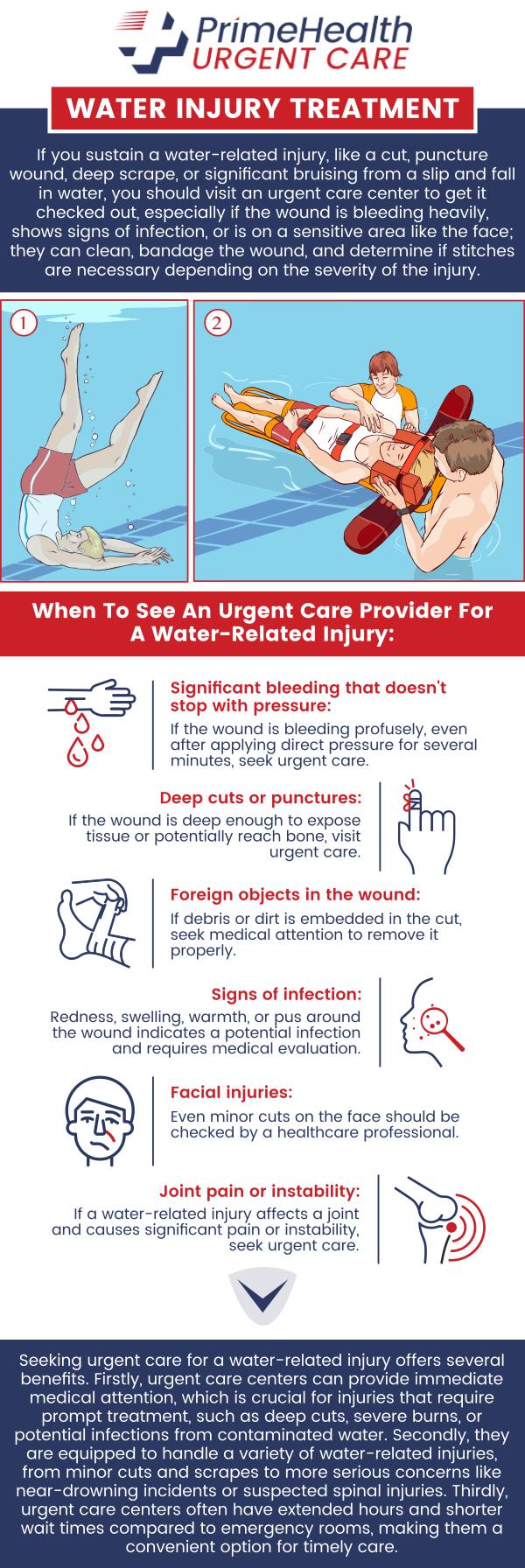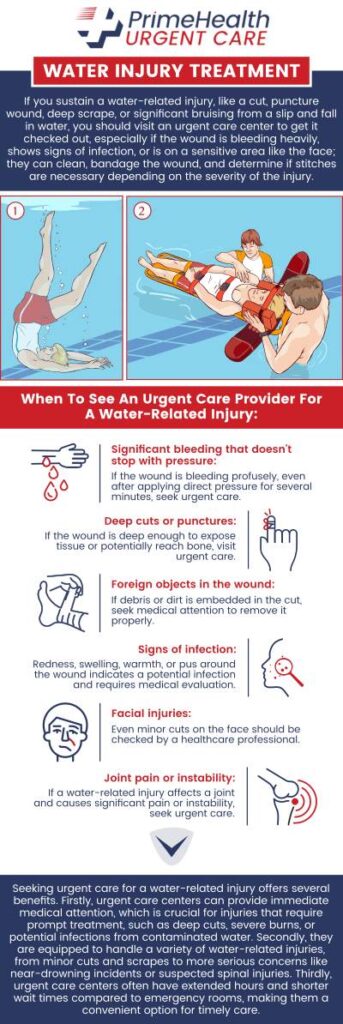Urgent Care for Water Injury Treatment in Port Charlotte, FL
Due to a rise in water activities, summertime brings a rise in water-related diseases and injuries, such as near-drownings, drownings, and recreational water illnesses. Ensuring water safety through swimmer supervision, proper use of life jackets, and maintenance of clean and safe swimming areas is essential to avoid these mishaps. If you or your child have a pool-related injury or illness, visit Dr. Espinal, MD, at PrimeHealth Urgent Care in Port Charlotte, FL. We are conveniently located at 23951 Peachland Blvd, Unit 1, Port Charlotte, FL 33954. For more information, contact us or request an appointment online.




Table of Contents:
What injuries and conditions can occur during water-related activities?
How to sleep with a swimmer’s ear?
What does recreational swimming mean?
What are the health problems associated with swimming?
When participating in recreational water activities or sports, some illnesses and injuries can occur, so being aware of what they are before participating is a great step to avoiding the risks of them happening. These illnesses and injuries can happen because of situations such as bacteria in the water, or from falling while participating in water sports. Water-borne illnesses are most commonly caused by viruses, bacteria, or parasites present in the water, and the increased likelihood of contracting these illnesses can be caused by accidentally taking the water into the mouth, direct contact with the skin, and inhalation of water droplets from the spray or mist of the water. If you are swimming in a public facility like a pool, these risks are much lower since the water in these facilities has been treated with chemicals like chlorine that can kill these contaminants. When swimming in lakes or rivers, these waters are not treated, so it can be helpful to research these locations, as there could be water advisories posted that can advise you of any potential water risks if there are any.
If you are participating in recreational water sports or competitive water sports, there are risks of injuries that can occur, as there are many other types of sports. This can range from sprains or strains of muscles, and in some sports such as wakeboarding, there are risks of breaking bones. It is important to follow all rules set out for safety when participating in water sports as this is the best way to reduce your risks of injury.
Swimmer’s ear is a condition that can occur during water-related activities. This happens when water becomes lodged in the inner ear, which can lead to discomfort and pain. If you have a swimmer’s ear, it is important to see a doctor so that they can prescribe antibiotics for it, eliminate the swimmer’s ear, and make sure that it does not become worse. Once you have received care for the swimmer’s ear, it is important to follow the rules set out by the physician. You should make sure you do not insert or put anything into your ear besides the prescribed medications, as there is a risk of irritating the ear or reducing the efficacy of the medications meaning that you can make the condition worse. When going in the shower, you should make sure to avoid allowing water into the ear, do not use ear plugs; instead, use a cotton ball that has been coated in petroleum jelly. To ease the pain and discomfort associated with a swimmer’s ear, you should place a warm cloth over the area, but make sure that it is not wet enough to allow water into the ear.
When sleeping, you should sleep on the opposite side of the swimmer’s ear, or sleep on your back, as adding pressure to the area when sleeping can cause further discomfort.
Recreational swimming can be considered swimming that is not sport-related. Those who swim recreationally are those who are not swimming to learn how to swim or to take life-saving water courses. Those who swim to get exercise, or bring their children to public pools, would also be considered recreational swimmers.
Health problems associated with swimming include conditions like swimmer’s ear, shoulder irritation, tendonitis of the rotator cuff, tears of the cartilage of the shoulder, and upper and lower back pain. It is important to remember when swimming, as low-impact as it is, that there are still risks associated with swimming and to listen to your body if it feels like stopping. If you do feel as though you have suffered an injury during swimming, you should speak with our urgent care physician, as he will be able to advise if the injury is acute or needs medical interventions. If the injury is acute, you should listen to the physician to make sure that you give it an appropriate amount of time to heal before returning to swimming. We are conveniently located at 23951 Peachland Blvd, Unit 1, Port Charlotte, FL 33954. For more information, contact us or request an appointment online. We serve patients from Port Charlotte FL, Murdock FL, Harbour Heights FL, Charlotte Harbor FL, and surrounding areas.

Additional Services You May Need

Additional Services You May Need
• Abscesses
• Sports Injuries
• Bug & Animal Bites
• BV Testing
• COVID Testing
• Drug Testing
• EKG Testing
• Flu Shots
• Foreign Body Removal
• Laceration Repair
• Minor Burn Treatment
• Pelvic Exams
• Strep Testing
• STD Testing
• Fractures, Sprains, & Strains
• Splinting Treatment
• School & Sports Physicals
• TB Testing
• Tetanus Shot
• Urgent Care
• Vaccines
• Wound Care
• Work Injuries
• X-Ray
• Internal Lab Services
• Illness/Injury
• Occupational Medicine
• Employment Physicals
• Common Cold
• Auto Injuries
• Weight Loss
• Wegovy
• Mounjaro
• Telehealth
• Stitches
• Respiratory Infection
• Coastguard Physicals
• Sick Visits





